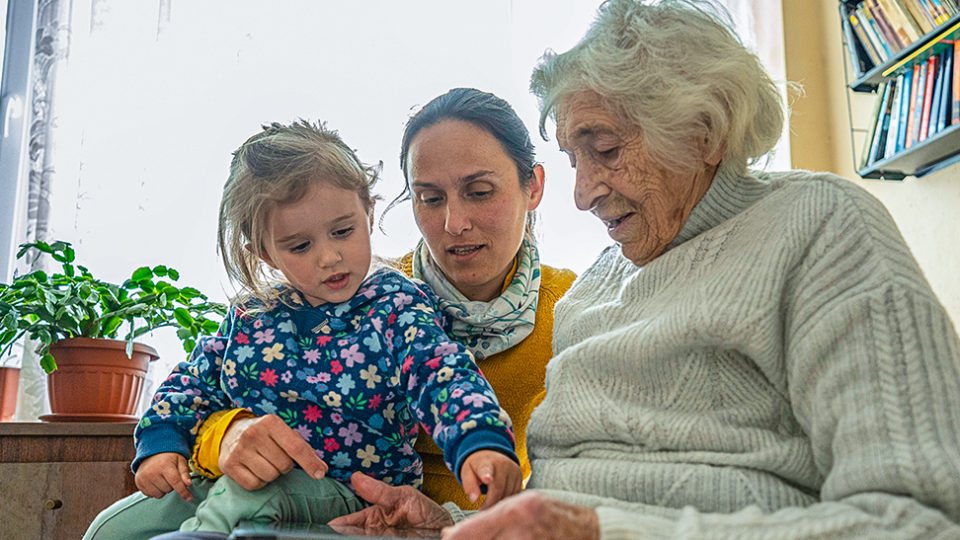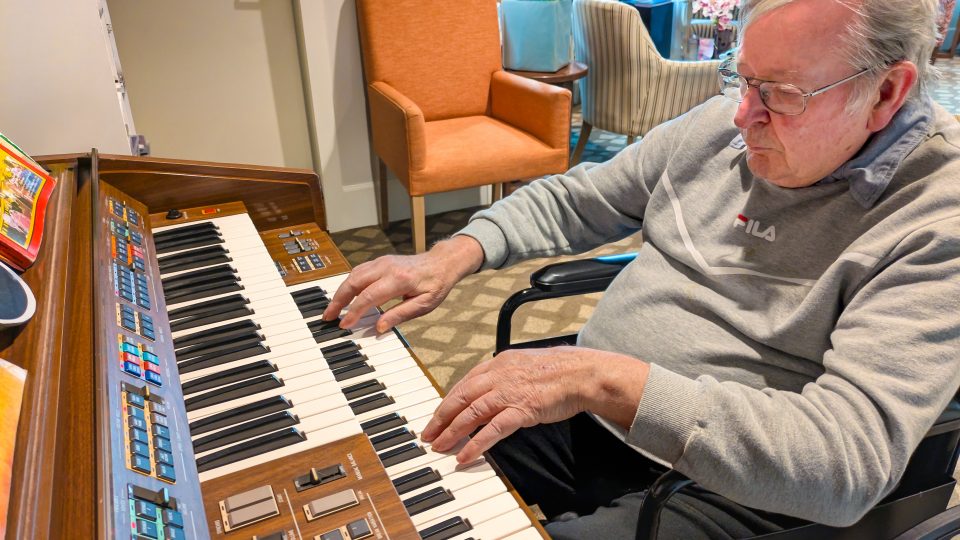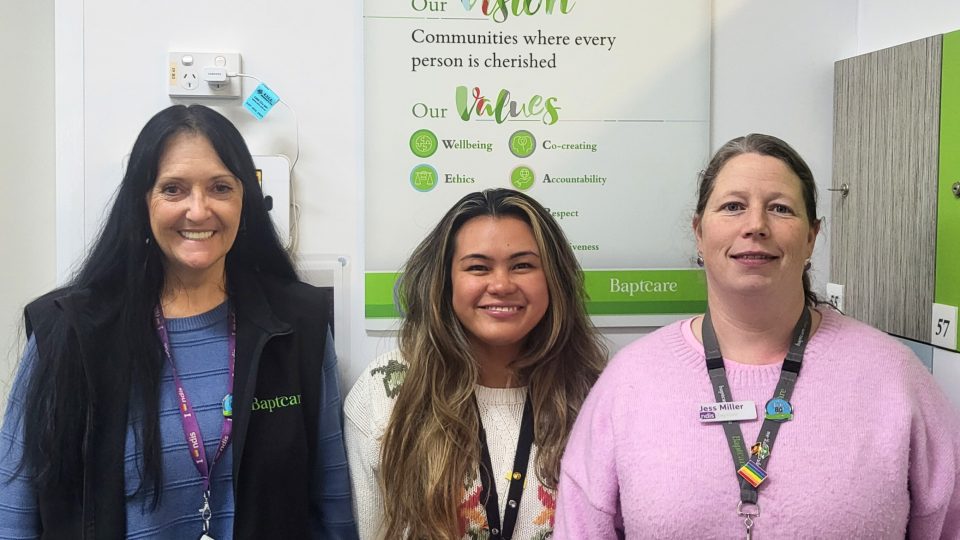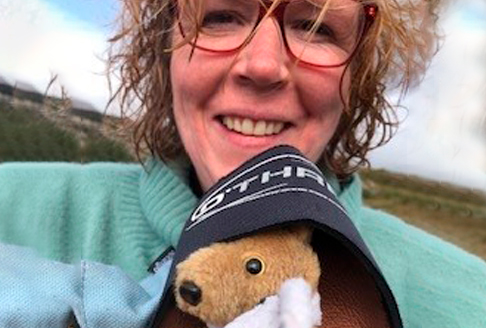In this world, there are some people who just talk. Then there are those other special people who actually walk the talk. Our Melanie Abbott is one of those people, although in her case, she swims the laps…
For the month of March, Mel has been involved in a fundraiser with Laps for Life and Reach Out organisations, raising money to prevent youth suicide.
“This March, I’m swimming to save lives,” says Mel. “I’m swimming laps to make sure young people in Australia have the mental health support they urgently need.”
As her colleague Ashley Vincent commented, “Mel has an exceptional capacity to give.”
Find out more about Mel below:
- What is your role at Baptcare and can you describe a typical day in your job?
My current role is Senior Mental Health Practitioner in the Mindset Foundations program in southern Tasmania, and a typical day isn’t a thing! Each day is different as I spend time out and about with clients working on their goals in their own real life environments. This means coming into the hub, collecting a car, having a chat to colleagues and then heading out across the south with a coffee and an audiobook. Some days I drive 177km to see someone and assist them with attending appointments or facing fears by going into a shopping centre etc. The part I really enjoy most is helping people work out what it is about a task or situation that is triggering for them and then helping them nut out strategies to give them the capacity to do things independently.
- Wow – that’s a lot of driving! Can you recommend a few audio books you’ve listened to recently? Do you play any particular music while you’re driving?
It depends on what sort of things are happening for the people I am seeing on any particular day. I do like a bit of Classic FM if things have been particularly heavy but other than that I quite like lighter audiobooks. However, there have been a few good reads about people living with mental health concerns lately: Kim Lock’s The Other Side of Beautiful, Emily Maguire’s Love Objects, Rose Cartwright’s Pure and Meg Mason’s Sorrow and Bliss. All these have protagonists with mental health challenges but the stories unfurl with compassion and kindness. Another book I need to rave about – it provides a hopeful take on childhood trauma – is Tabitha Bird’s A Lifetime of Impossible Days. Somehow Tabitha manages to bring light and love into a very dark space by having her main character travel back in forth in time and then there’s the gumboots…
- What do you like about working with Baptcare and in the mental health space?
It’s all about the people I work with. They always surprise me with their amazing tales of survival and resilience (even if they can’t see it at the moment we start our journey together). Our clients are some of the most amazing people. Every day that I have the privilege to listen and be with them is humbling.
- Did you always want to work within the mental health space?
I came into Social Work after working at University of Tasmania (UTAS) in Asian Languages and Studies and then in local government in regional Japan, so mental health wasn’t a space I thought I’d end up working in. Once I found this job though, I was pretty soon hooked. It’s a role which helps people develop hope and confidence in themselves and it is a privilege to see people face fears and grow. We have a lot of flexibility in how and where we work and that makes the program fit so many people.
- How long did you live in Japan and did you notice any major cultural differences in their approach to mental health?
All up I lived in Japan for four years. It’s pretty interesting as there seems to be a stronger taboo about discussing mental health issues in general in Japan, and yet media coverage of suicide, and particularly youth suicide is much more open. In the 1990s it was very common for a local teen suicide to be covered in quite a bit of detail with the obligatory classroom shot – with one desk covered in flowers. However, asking for assistance or treatment for mental health conditions was very secretive. This may have changed a bit, and there was a lot of work done following the Great Hanshin Earthquake in 1995 and I would suspect after the tsunami and Fukushima nuclear disaster in 2011 when so many people really struggled to cope with what had happened. I don’t want to criticise Japan or Australia or any other country for their approach to mental health as it is so tied to all sorts of aspects of culture and context. There’s good and bad in any country’s approaches to mental health and, more to the point, so much work and change is happening in this sector all the time.
- We see that you are currently doing a fundraiser (Laps for Life) to raise money for youth suicide. What inspired you to do this? I’ve been enthusiastically snorkelling with a group of passionate women in the SNOT (Snorkel Nerds of Tasmania) group this summer and have loved being back in the water. There are so many fundraising and exercise programs out there I couldn’t resist when something that combined swimming and mental health came up.
- What have you learnt about youth suicide from working with Mindset? Our program works with people aged 18+ and most people I have worked with are much older than the youth age group. I did work with someone who had just become an adult and listening to their parents talking about not being able to find youth services that actually offered practical assistance was a bit of an eye opener. Also, when I shared this on my personal Facebook I was very conscious that quite a few of the people on there have deep personal grief as a result of youth suicide.
And now for a few personal questions…
- What did you want to be when you grew up? An interpreter at the UN – those booths look amazing.
- Can you tell us something surprising about yourself? I don’t eat crayfish after learning too much about how they procreate while interpreting between Japanese and English at an international symposium.
- Do you have a favourite quote or motto in life? How can you choose just one?
- How would your friends describe you? Reeking of chlorine at the moment I suspect?
- Can you describe your ideal weekend to us? Time to swim or snorkel, potter in the garden, bake something, read, yoga and have the house faeries magic the house into submission!
- Do you have a mentor or idol? OR If you could sit next to someone at a dinner party, who would it be and why?
The two times I have met idols – Julian Burnside and Rodney Croome – I have been almost too overwhelmed to speak so it would be a very quiet dinner!
Some questions about swimming:
- How bad are the prune-y hands and green hair factors?
If you keep moving at a decent pace the prunes stay away. I’m a fading redhead so am safe from the green hair issues.
- Do you have any special swimming routines?
Try not to think about how much further and faster I would have been as a teenager when I was training seriously, and listen to my body. I try to relax into the rhythm and let my mind wander, today’s pearl of wisdom was “lap 43 is just as important as lap 1 and lap 50”.
- What have you learned about yourself/and swimming from doing this challenge? And do you think you’ll become one of those iceberg winter swimmers?
Unfortunately, my asthma doesn’t play nice if I try to swim distances in cold saltwater. I deliberately bought a longer pass to the pool to encourage me to keep it up. Having been a competitive swimmer back in my teens, maybe this is me starting my late in life swimming routine?
Community news
-

The sandwich generation phenomenon unpacked
Welcome to the first of two blogs on the theme of the sandwich generation in Australia. In this one, we’ll cover the definition of the sandwich generation, the different types of caring that fall within it and some of the issues those in the sandwich generation face. The second blog will cover tips for dealing with life in the sandwich generation
- 02 Jul 2025
-

Wyndham Lodge Choir
Every Tuesday afternoon, residents gather in the sunny music room at Baptcare’s Wyndham Lodge Residential Aged Care community to sing together.
- 25 Jun 2025
-

The Green Team at Moonah Hub
The Sustainability Team, known as ‘The Green Team’, are based at Baptcare Moonah Hub in Hobart and are all about promoting environmentally friendly and sustainable practices in their office, the wider organisation and the local community. We asked Jess Miller, their enthusiastic and determined leader, all about the team and what they do. Read more below!
- 11 Jun 2025

